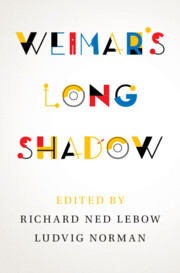
-
Select format
-
- Publisher:
- Cambridge University Press
- Publication date:
- 26 September 2024
- 27 June 2024
- ISBN:
- 9781009484329
- 9781009484343
- 9781009484305
- Dimensions:
- (229 x 152 mm)
- Weight & Pages:
- 0.576kg, 286 Pages
- Dimensions:
- (229 x 152 mm)
- Weight & Pages:
- 0.417kg, 286 Pages
You may already have access via personal or institutional login
Book description
Weimar casts a long shadow over post-war political thought. The Weimar Republic is used to understand contemporary threats to democracy and to critique or defend modernity. It has generated a series of political lessons that are invoked whenever democracies are challenged. This book questions the historical validity of most of these lessons and their applicability to contemporary political orders. It shows how Weimar lessons are often influenced by partial and superficial readings of events, often intended to advance particular political projects. The chapters give detailed accounts of how so-called Weimar lessons have influenced, if not shaped, political debates in Germany, elsewhere in Europe, and the United States.
Reviews
‘Weimar's Long Shadow magnificently captures the relevance of Germany's first failed experiment in democracy for our own troubled times. The authors do not exaggerate the similarities. Rather, in essays that range from treatments of Strauss and Trumpian Straussians, to militant and social democracy, and the TV series Babylon Berlin, they illuminate concerns central to us now.'
David Dyzenhaus - University Professor of Law and Philosophy, Toronto
‘This stimulating book shows that Weimar is more than a negative model for the collapse of democratic regimes. It makes a strong case for using analogies as a fruitful device for a more careful consideration of the complexities of modernity. The case of Weimar therefore continues to be of great systematic value to both international historians and political scientists.'
Wolfram Pyta - University Professor and Head of the Department of Modern History, University of Stuttgart
‘As the paradigm of democratic fragility, the Weimar Republic has both sensitized and blinded thinkers to the dangers of later situations. Even as they anatomize the mechanisms that flatten analogy into ‘lessons learned,' these essays exemplify a better use of history: open-ended engagement with cases to generate questions for the present.'
Dorothy Noyes - The Ohio State University
‘Highly recommended.’
G. P. de Syon Source: Choice
Contents
Metrics
Altmetric attention score
Full text views
Full text views help Loading metrics...
Loading metrics...
* Views captured on Cambridge Core between #date#. This data will be updated every 24 hours.
Usage data cannot currently be displayed.
Accessibility standard: Unknown
Why this information is here
This section outlines the accessibility features of this content - including support for screen readers, full keyboard navigation and high-contrast display options. This may not be relevant for you.
Accessibility Information
Accessibility compliance for the PDF of this book is currently unknown and may be updated in the future.

